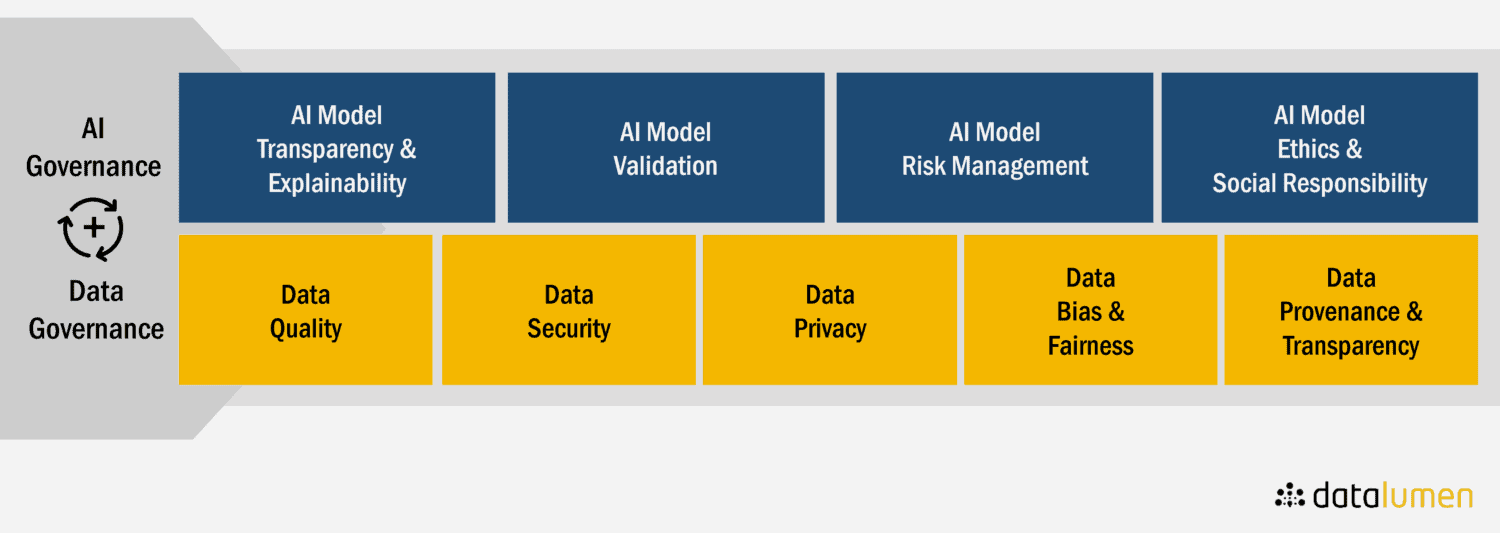AI & DATA GOVERNANCE: THE INTERSECTION YOU CAN’T MISS TO MAKE AI RESPONSIBLE & TRUSTWORTHY
Artificial Intelligence (AI) has become a transformative force across industries, offering significant benefits such as increased efficiency, personalized services, and better decision-making. However, the adoption of AI also raises ethical, legal, and social concerns, necessitating effective governance mechanisms. AI governance involves establishing policies, regulations, and best practices to ensure the responsible development, deployment, and use of AI. A crucial aspect of AI governance is data governance, which focuses on managing and ensuring the quality, security, and ethical use of data.
The Importance of Data Governance for AI
Data governance is the foundation of any AI system, as AI models rely on data to learn, make predictions, and provide insights. The quality, diversity, and fairness of the data used in AI models significantly impact the accuracy, reliability, and fairness of AI outcomes. Therefore, robust data governance is essential for building trustworthy AI systems that deliver value while respecting ethical considerations and legal requirements.
Effective Data Governance for Trustworthy AI
Effective data governance includes several key elements:
- Data quality:
Ensuring the accuracy, completeness, consistency, and timeliness of data used in AI models is crucial for generating reliable outcomes. Data cleansing, validation, and normalization techniques can help improve data quality. - Data security:
Protecting data from unauthorized access, theft, and misuse is essential for maintaining trust and complying with data protection regulations. Encryption, access controls, and monitoring can help ensure data security. - Data privacy:
Respecting individuals’ privacy rights and complying with data protection regulations, such as GDPR, is essential for ethical AI development. Techniques such as differential privacy, data anonymization, and user consent management can help protect individual privacy. - Data bias and fairness:
Ensuring that data used in AI models is representative, unbiased, and free from discrimination is critical for building fair and equitable AI systems. Techniques such as bias detection, mitigation, and fairness-aware machine learning can help address data bias and promote fairness. - Data provenance and transparency:
Providing clear documentation and explanations of data sources, processing, and usage is essential for building trust and accountability in AI systems. Techniques such as data lineage, model cards, and interpretability methods can help improve data and model transparency.
AI Governance: Building on Data Governance Foundations
Effective AI governance builds on these data governance principles and includes additional considerations:
- AI model transparency and explainability:
Providing clear explanations and justifications for AI model outcomes is essential for building trust, ensuring accountability, and facilitating auditability. Techniques such as SHAP, LIME, and decision trees can help improve model explainability. - AI model validation and testing:
Ensuring the accuracy, reliability, and robustness of AI models through rigorous testing, validation, and monitoring is crucial for building trust and ensuring safe and effective AI systems. Techniques such as cross-validation, stress testing, and model monitoring can help ensure model performance and reliability. - AI model risk management:
Identifying, assessing, and mitigating risks associated with AI models, such as safety, security, and reputational risks, is essential for responsible AI development. Techniques such as risk assessment frameworks, risk mitigation plans, and incident response plans can help manage AI risks. - AI ethics and social responsibility:
Ensuring that AI systems align with ethical principles, such as fairness, accountability, transparency, and social responsibility, is crucial for building trust and ensuring societal acceptance. Techniques such as ethical frameworks, social impact assessments, and multi-stakeholder engagement can help promote AI ethics and social responsibility.
Conclusion
AI governance and data governance are interconnected and interdependent, as effective data governance is essential for building trustworthy AI systems. By adopting robust data and AI governance practices, organizations can ensure the responsible development, deployment, and use of AI systems, while delivering value, building trust, and maintaining compliance with legal and ethical requirements. As AI continues to evolve and transform industries, effective governance will be crucial for achieving responsible and trustworthy AI that delivers long-term value and benefits for all stakeholders.











